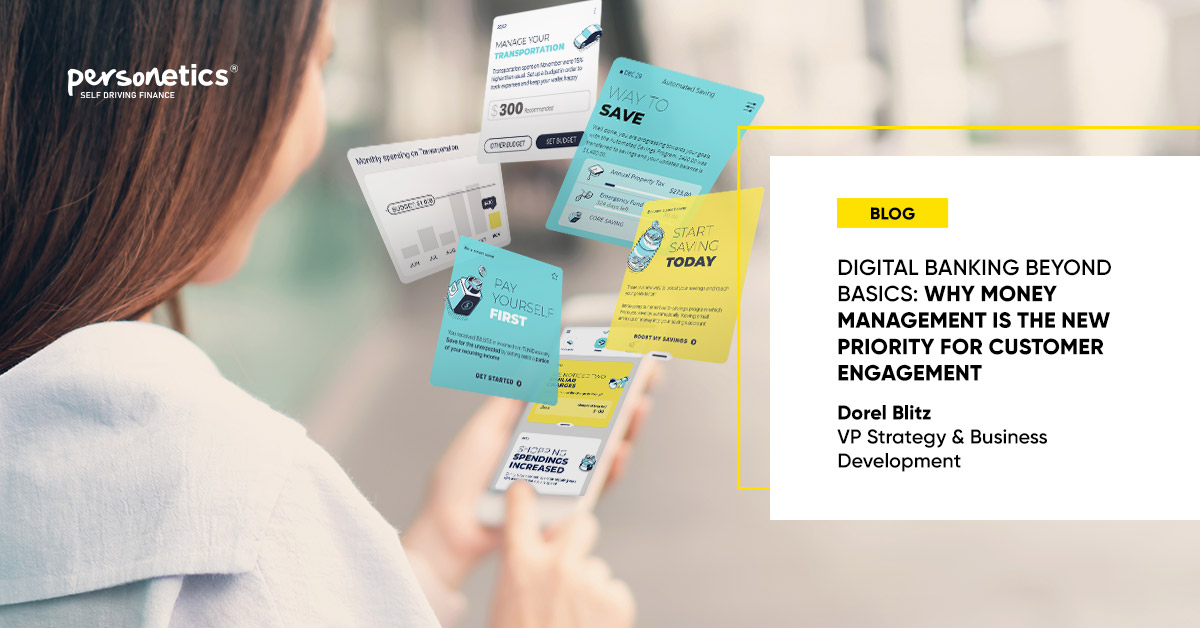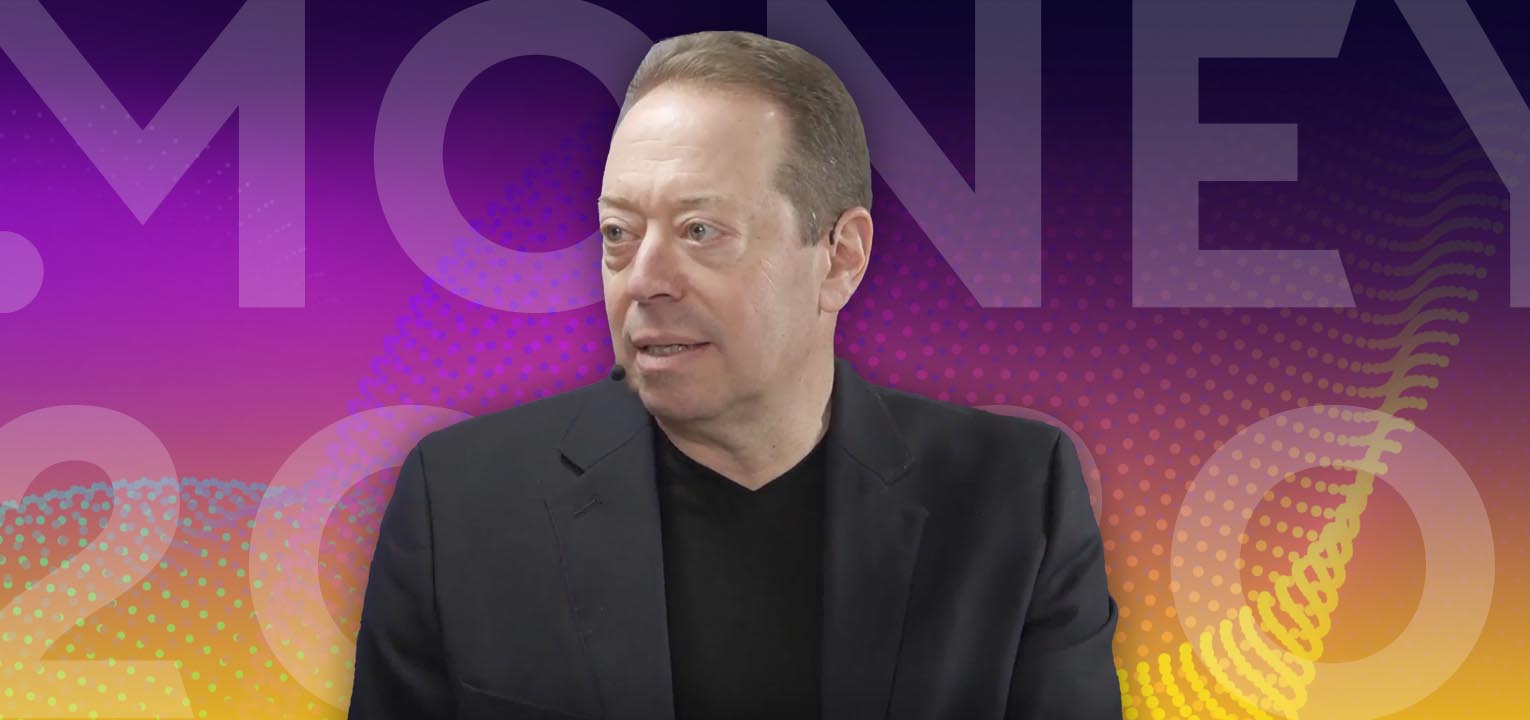March 24, 2022
Digital Banking Beyond Basics: Why Money Management is the New Priority for Customer Engagement

Financial institutions need a new approach to digital banking. The conventional features and tools of Personal Financial Management (PFM) have failed to reach their potential in driving engagement and generating revenue or have become table stakes with no real competitive differentiation. If banks want to drive business impact, they need to take their customer engagement to a higher level, and reimagine the meaning of the essential role that they play in their customers’ lives. This new role can be defined as: Money Management.
Money Management is the new competitive battleground for banks, as digital banking solutions evolve beyond PFM. Bank customers’ expectations are changing, and they are demanding a higher level of sophistication in the level of support that they receive from their financial institutions. Banks need to take an active role as trusted advisors, who help customers manage their everyday finances and support their financial wellness.
Digital banking solutions are at the center of this evolution in the banking operational model. Conventional PFM tools are no longer sufficient to create a deeper relationship, show the full view of the customer’s financial life, drive business impact and truly affect people’s financial wellness.
What’s next? Money Management. This category represents a set of financial data-driven tools that improve a customer’s financial wellness with spend analysis, transaction categorization, smart budgets, automated savings tools, and personalized advice and recommendations. Money Management capabilities enable the financial institution to take a proactive role in shaping the future of their customers’ financial lives, by helping customers make better financial decisions and execute the right money moves at the right time, based on each customer’s cash flow and financial goals.
Here are a few signs that your institution is at risk of being left behind in the new era of Money Management:
- You’re getting complacent about your digital banking tools
- You’re taking a hands-off approach and expecting your customers to set their own budgets and manage their own savings goals
- You’re hiding your PFM tools behind a confusing list of sub-menus or tabs within the mobile banking app
Challenger banks and forward-leaning financial institutions are launching a new generation of Money Management solutions that create a compelling customer experience and put the bank at the center of the customer’s financial life. When you put Money Management at the heart of your digital banking experience, financial institutions can…
- Increase Customer Lifetime Value by creating a closer, intimate relationship with your customers.
- Engage with customers on a daily basis, based on real time data and the latest changes in your customers’ lives, to find moments of truth for efficient cross-selling and servicing.
- Transform your institution to a customer-centric, financial data-driven model where you have better visibility of your customer’s financial life.
- Proactively reach out to your customers with personalized recommendations and relevant product-based advice.
Let’s take a closer look at how financial institutions can embrace the new opportunities of Money Management.
Beyond PFM: Why “Money Management” is the Next Evolution of Digital Banking
What is the future of digital banking? Customers’ expectations are changing, and they want their banks to take a higher-level role in helping them manage money. The Personal Financial Management (PFM) category is no longer inclusive or relevant enough to capture the full picture of what financial institutions need to do to support customers’ needs.
PFM solutions are evolving into Money Management capabilities, with versatile, intelligent apps and platforms to help customers manage money with predictive analytics, guidance, holistic financial analysis, calls to action (product/service-based advice), autonomous finance, omni-channel engagement and unified advice, and a hybrid model of servicing customers and providing advice at scale with digital plus human interactions.
There are a few reasons why Money Management is becoming the new essential category for engaging with customers and enhancing customer relationships for financial institutions.
Money Management Provides the Digital Banking Tools and Experiences That Customers Want
There are new opportunities emerging for financial institutions to deliver a higher level of value with their digital banking tools and features. Many online banking tools have become table stakes, like being able to check your balances on the go, or transfer money, or pay bills online. Bank customers are becoming frustrated with the limitations of basic digital banking tools.
Consumers expect their bank to support their financial wellness with helpful digital tools, and they want a more holistic view of their financial situation, and personalized experiences. This is the promise that Money Management can fulfill as a category of digital banking.
By adopting a Money Management approach for digital banking, financial institutions can provide:
- Advanced real time analytics to monitor cash flow management based on each customer’s financial transaction data, income, and spending patterns
- Easy tools to pay bills and automate debt payments
- “Trusted advisor” experiences: instead of a transaction-based approach to selling products or opening accounts, Money Management helps financial institutions deepen their customer relationships as trusted advisors – driving business impact with more effective cross-selling, bigger share of wallet, and higher Customer Lifetime Value
It’s not good enough to give your customers a list of online banking tools or a long menu of tabs and buttons to click through. Your digital banking experience needs to be more proactive and intimately involved with your customers’ financial lives, seamlessly integrated within the context and the user experience – showing them how to make the right moves and manage their money effectively, looking out for their well-being, and being there to help guide them in a better direction financially.
Money Management Improves Customer Experience and Customer Satisfaction
Money Management can help banks build deeper relationships with customers and strengthen their brand value. A Forrester survey of financial institution decision-makers found that after implementing digital money management tools:
- 51% say their banks have measured an improved customer experience
- 50% report an improved brand value and perception
- 55% report that, after their banks implemented digital money management tools, they saw a spike in digital banking adoption, and 31% of respondents expect to see that increase in the future.
Higher adoption of digital banking has enabled channel optimization, with better cross-channel experiences and reduced friction in the customer experience. Money Management solutions are an ideal fit for digital banking, and as more customers start to use digital money management tools, they will expect more from their banks, and engage more with their banks, in a virtuous cycle of deepening relationships. The more value you can give to your customers, the more engagement and longer-term loyalty you can receive.
Money Management Drives Financial Wellness
Financial institutions have an opportunity to build trust with customers and become trusted advisors that help guide their customers’ financial lives. Money Management capabilities can be at the center of this process of evolving the banking business model – from transactions to trusted advisor.
Many banks have room for improvement in this area. The Forrester report found that 40% of APAC consumers “aren’t confident that their banks act in the best interest of their financial wellness.”
Money management and financial wellness are connected. After seeing the benefits of digital money management tools:
- 45% of decision-makers say their banks plan to increase the budget allocated to digital money management tools in the next 12 months
- 57% of respondents’ banks will increase their spend on financial wellness initiatives in the next 12 months
Bottom Line: Money Management is the New Strategic Priority
Money Management is not just one digital tool or feature, it’s not just one narrow category. Money management is a defined strategy, focusing on financial data-driven engagement to improve customers’ financial wellness and increase the banks’ business impact. Decision-makers need to understand the implications of Money Management for their institutions, create business cases for it, and properly budget for this space.
Sooner than you might imagine, Money Management is going to become the new strategic battleground for digital banking. Each institution needs to plan for how to focus their strengths, how to differentiate yourself in the market, and how to drive business impact. The battleground today in Money Management is not just banks vs. fintechs, or banks vs. banks – it is banks vs. customer expectations. If your institution cannot deliver the right level of Money Management support to your customers, with the right solutions, guidance, personalized advice and insights, and the ability to be there for your customers and know the full picture of their financial lives, you are going to fall behind.
Leaders in Money Management will be able to capitalize on the new opportunities of digital banking and the emerging capabilities of Open Finance. These leading institutions will be able to go beyond the basics of selling products and opening accounts and take a proactive role in shaping their customers’ financial lives for the better. And what’s good for customers will also be good for financial institutions. Money Management is not just a “nice to have” or an act of generosity for customers; it’s an essential, strategic revenue engine.
Here are a few examples of how the biggest business impact of digital banking will come from Money Management:
- Being able to recommend the right product to the right customer at the right time
- Getting a clear view of the customer’s financial life, based on real time customer financial transaction data
- Offering personalized insights and product-based advice to customers based on their spending patterns, income, and transaction data
- Highly effective cross-sell targeting with relevant recommendations based on customer data – the “Netflix Effect” for Money Management
- Achieving higher customer loyalty and customer satisfaction
- Deepening customer relationships to drive bigger Customer Lifetime Value
- Increasing core deposits with automated savings programs
- Boosting Assets Under Management (AUM) for Wealth Management teams with automated investing programs
For all these reasons and more, Money Management is becoming a strategic priority for digital banking. Understanding the business impact of Money Management, and taking proactive steps to prepare, plan, and budget for this category, will shape the future of digital banking and will separate leaders and laggards in financial services.
Ready to learn more about Money Management and see our latest capabilities? Talk to Personetics today.
Sources:
i Forrester study commissioned by Backbase: “State of Banking and Financial Wellness,” https://www.backbase.com/banking-financial-wellness-apac/
Want To See How Cognitive Banking and AI Can Transform Customer Engagement?
Request a Demo Now
Latest Posts

Meet Personetics at North America Banking & Fintech Events in 2026

Meet Personetics at LATAM Banking & Fintech Events in 2026

Meet Personetics at APAC Banking & Fintech Events in 2026

How to Monetize AI While Building Trust

Cognitive Banking, Primacy, and the New AI Playbook for Banks: Insights from Money 20/20

How to Prevent Churn & Grow Wallet Share: Bank Primacy Playbook

Dorel Blitz
VP Strategy & Business Development
Dorel Blitz brings over 13 years of experience in global strategy and business development in the financial services industry. Dorel joins Personetics from KPMG, where he headed the Fintech sector at KPMG Israel and a member of the global Fintech practice. In this role, Dorel was instrumental in establishing KPMG’s collaborative relationships with global financial institutions and leading Fintech companies including Personetics. He also acted as a subject matter expert and led advisory projects involving digital transformation strategies with financial services organizations. Prior to joining KPMG, Dorel led the Innovation & Fintech practice at Bank Leumi, and earlier in his career he headed the banking & finance division at global research firm Adkit.









